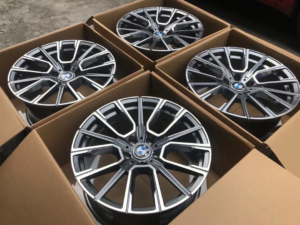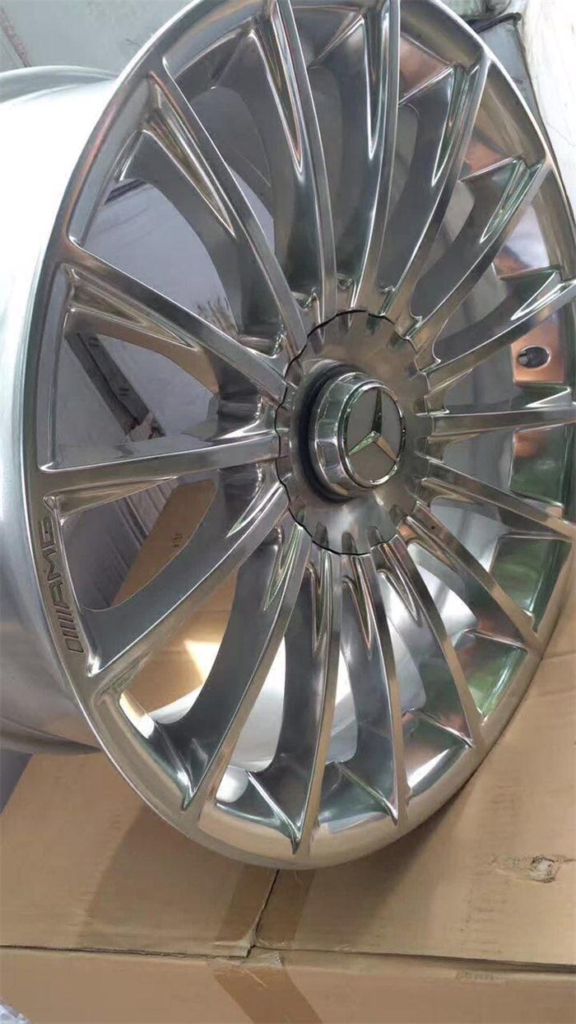What are the benefits of modifying forged wheels? (Can forged wheels really increase power?)
Modifying a set of better-looking wheels can make the car look better. There are two different manufacturing processes for wheels: forging and casting. Forged wheels have superior performance in all aspects compared to cast wheels, but they are also much more expensive. If price is a concern, cast wheels can be chosen instead. In terms of design, forged wheels can be designed with more lively and slender spokes, and the design flexibility is high, which can be designed according to customer requirements to better suit the overall appearance of the customer’s car, making it more personalized and better at handling.
Modifying forged wheels increases the width of the wheels without affecting steering and loading. Forged wheels are almost born for street racing and represent the ultimate performance. Many performance car owners like to modify forged wheels. Forged wheels have the highest density and lightest weight, and can withstand extreme pressure, such as extreme cornering or braking. They can be made into various exaggerated styles to make the wheels stand out.

modifying forged wheels
Due to cost issues, the inside and outside of the original wheels are usually painted with similar colors. Fake and imitation wheels have significant color differences inside and outside, so they are easily distinguishable from appearance and workmanship.
Forging is currently the most advanced method for manufacturing aluminum wheels, with its most prominent advantages being high strength, increased safety, strong ductility, light weight, good heat dissipation, and fuel economy. The disadvantage is that the price is slightly higher and the production cycle is longer. Forged wheels use steel molds, and heated and softened aluminum blocks are placed in the molds and forged. The advantages of forged wheels are that they are lightweight, have good heat dissipation, high strength, better stability and safety during use.
There are two methods for manufacturing automobile wheels, forging and casting, and there are technical and structural differences between one-piece forged wheels and multi-piece forged wheels. Forging is a processing method that uses forging machines to apply pressure to metal blanks to obtain forged parts with certain mechanical properties, shapes, and sizes. Forged wheels can be divided into one-piece forged wheels and multi-piece forged wheels, and their advantages include being lightweight, high strength, increased safety, strong ductility, good heat dissipation, and fuel economy.

modifying forged wheels
Forged wheels are currently the most advanced method for manufacturing aluminum wheels, and forged aluminum wheels are 1 to 2 times stronger than cast aluminum wheels and 4 to 5 times stronger than general iron wheels, making them more robust, crash-resistant, and have greater toughness and fatigue strength. The forging process uses steel molds, and heated and softened aluminum blocks are placed in them and formed by stamping. After cooling, they are machined to create the final product. Casting is easier to mass produce, while forging has a more complex process and therefore higher manufacturing costs. However, in the production process of forged wheels, the aluminum blocks are continuously stamped.
Therefore, if the power and brake remain unchanged, the acceleration time and braking distance may not be as good as the original factory. However, if lighter materials or higher techniques such as forging are used, the weight of large wheels may become lighter and the performance of the vehicle may be better, but the price is high. As the name suggests, forged wheels are made by forging, which can remove internal pores and cracks to the greatest extent. Forging often involves multiple forging, which can ensure the removal of material defects in all aspects, increase the internal stress of the material, and improve toughness, impact resistance, and tear resistance at high speeds. After switching to forged aluminum wheels, as a truck driver myself, the weight of the entire vehicle was reduced by 0.44 tons, and I made an extra $26,000 a year from hauling goods. In addition, after a year of driving, fuel consumption was reduced by 5%, saving $24,000, and there were also fewer tire problems and repair costs.
First of all, forged wheels can basically be customized, so you can make your wheels unique. Of course, you can also choose the styles already made by the manufacturer, which are also very beautiful. Looking at the production process, the production process of forged wheels is relatively precise and requires many processes, which are divided into integral molding and multi-piece forging. The former is lighter in weight.
Of course, people also change the color of their wheels by painting or replacing the wheel covers of low-end cars with wheels to improve their appearance at minimal cost. However, in our eyes, these people are not considered modifications, at best, they are considered as decoration. When changing wheels, most people prefer to go larger than the original factory size because they look better, just like how men prefer big breasts.
Therefore, the primary consideration for selecting wheels is safety, followed by functionality and appearance. After all, wheels can be modified, but life cannot be restarted. Many people believe that using forged wheels is definitely safer than cast wheels. In fact, this is a very wrong statement. I am here to refute this and explain the reasons.
Our factory Jianglu wheels are professional in forged wheels for many years, we accept OEM /OEM service.
If you want catalogue , you can visit our website and lejupielādēt it .
If you need quotation, you can contact us our WhatsApp directly ,

Julius Ningbo Jianglu Auto parts
